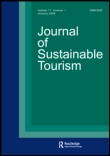
Journal of Sustainable Tourism
Scope & Guideline
Innovating pathways to responsible and sustainable travel.
Introduction
Aims and Scopes
- Sustainable Development and Policy:
Research that examines sustainable tourism policies, practices, and frameworks aimed at mitigating the environmental impacts of tourism while promoting economic and social benefits for local communities. - Environmental and Ecological Impacts:
Studies focused on the ecological consequences of tourism, including climate change, biodiversity conservation, and resource management, highlighting the need for sustainable practices in tourism operations. - Social and Cultural Dimensions:
Exploration of the social and cultural impacts of tourism on communities, including issues of justice, equity, and community well-being, with an emphasis on local perspectives and voices. - Consumer Behavior and Engagement:
Investigating the behaviors and attitudes of tourists and industry stakeholders towards sustainability, including pro-environmental behaviors, ethical consumption, and community engagement. - Innovative Methodologies:
Utilization of diverse methodological approaches, including qualitative, quantitative, and mixed methods, to understand complex tourism phenomena and inform sustainable practices.
Trending and Emerging
- Climate Change and Tourism Resilience:
An increasing number of studies are focusing on the relationship between climate change and tourism, exploring resilience strategies and adaptation measures to address the impacts of a changing climate on destinations. - Social Justice and Inclusivity:
Research emphasizing social justice, equity, and inclusivity in tourism practices is on the rise, reflecting a growing awareness of the need to consider diverse perspectives and the rights of marginalized communities within tourism discourse. - Digital Transformation and Sustainability:
The integration of digital technologies in tourism, including the use of big data, social media, and online platforms, is becoming a significant area of research, particularly in relation to promoting sustainable practices and consumer engagement. - Health and Well-being in Tourism:
Emerging studies are increasingly focusing on the health and well-being aspects of tourism, particularly in light of the COVID-19 pandemic, exploring how tourism can contribute to individual and community well-being while promoting sustainable behaviors. - Community-based Tourism and Empowerment:
There is a growing trend towards research on community-based tourism models that empower local residents, enhance their participation in tourism development, and promote sustainable livelihoods.
Declining or Waning
- Traditional Economic Impacts of Tourism:
Research focusing primarily on the economic benefits of tourism without an integrated approach to sustainability has become less prominent, as the field shifts towards a more holistic understanding of tourism's impacts. - Overt Tourism:
The focus on overtourism as a standalone issue has diminished, with researchers increasingly integrating discussions of overtourism into broader sustainability frameworks rather than treating it as a separate phenomenon. - Static Models of Tourism Development:
The reliance on static or prescriptive models of tourism development is waning as the field embraces dynamic, adaptive frameworks that consider the complexities and changes in tourism landscapes. - Short-term Tourism Studies:
There has been a noticeable decrease in studies that focus on short-term tourism impacts or events; instead, there is a growing emphasis on long-term sustainability and resilience in tourism practices.
Similar Journals
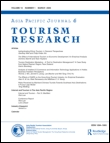
Asia Pacific Journal of Tourism Research
Pioneering Knowledge in Asia Pacific TourismAsia Pacific Journal of Tourism Research is a premier academic journal dedicated to advancing knowledge in the fields of tourism, leisure, and hospitality management. Published by ROUTLEDGE JOURNALS, TAYLOR & FRANCIS LTD, and based in the United Kingdom, this journal has established itself as a leading voice in research ranging from sustainable tourism practices to the socio-economic impacts of travel in the Asia Pacific region. With an impressive Q1 ranking in both Geography and Tourism categories for 2023, it boasts a Scopus rank of #77 out of 821 in Geography and #32 out of 146 in Tourism, emphasizing its critical role in the academic community. Researchers, professionals, and students can benefit from its insights and findings, making it an essential resource for anyone involved in the tourism sector. The journal's commitment to fostering innovative research contributes significantly to our understanding of tourism dynamics from 2003 to 2024 and beyond.
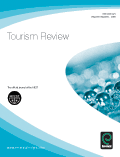
Tourism Review
Fostering innovation in geography, planning, and tourism.Tourism Review, published by Emerald Group Publishing Ltd, stands as a premier academic journal dedicated to advancing the field of tourism studies, with an impressive focus on geography, planning, and development. This journal, which has been contributing to the academic community since 2001, is ranked in the top quartile (Q1) for both Geography, Planning and Development and Tourism, Leisure and Hospitality Management, reflecting its significant impact and authority in the sector. With an exceptional standing in Scopus rankings—14th out of 821 in Social Sciences and 15th out of 146 in Business, Management, and Accounting—Tourism Review provides rigorous, peer-reviewed research that is essential for scholars, practitioners, and students engaged with contemporary tourism issues. This journal serves as a crucial platform for disseminating knowledge and fostering innovative solutions within the tourism sector, thereby contributing to sustainable development and enriching the experience of travelers worldwide. Although not an open-access journal, it offers valuable insights and comprehensive research suitable for those who wish to deepen their understanding of tourism dynamics.
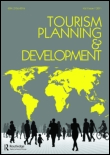
Tourism Planning & Development
Shaping the future of tourism with research-driven strategies.Tourism Planning & Development is a leading academic journal published by Routledge Journals, Taylor & Francis Ltd, focusing on the intersection of tourism, sustainable development, and strategic planning. With an ISSN of 2156-8316 and an E-ISSN of 2156-8324, this journal serves as an essential resource for researchers, professionals, and students engaged in the fields of Business, International Management, and Tourism. With a notable impact factor indicated by its placement in Q1 and Q2 quartiles across key categories for 2023, it reflects significant influence and quality within its disciplines. The journal's scope covers groundbreaking research from 2011 to 2024, ensuring a comprehensive exploration of contemporary issues in tourism planning and its developmental implications. Located in the United Kingdom, the journal's commitment to advancing knowledge in tourism and sustainable practices makes it a valuable platform for scholarly discussions and innovation.
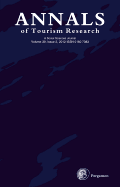
ANNALS OF TOURISM RESEARCH
Exploring the frontiers of tourism, leisure, and hospitality.ANNALS OF TOURISM RESEARCH, published by PERGAMON-ELSEVIER SCIENCE LTD, is a premier journal dedicated to the advancement of knowledge in the fields of tourism, leisure, and hospitality management. Established in 1973, this well-respected publication has been instrumental in shaping contemporary research and practice within the tourism sector. With an impressive 2023 Q1 ranking in multiple categories including Business and International Management, Development, Marketing, and Tourism, Leisure, and Hospitality Management, it boasts a strong scholarly impact, evidenced by its elite Scopus rankings—ranked 2nd in Development and 7th in both Business and International Management, and Tourism sectors. Researchers, professionals, and students alike can benefit from its rich content, disseminated through conventional access, fostering an influential platform for emerging insights and empirical studies. As it converges through decades of extensive research, ANNALS OF TOURISM RESEARCH stands at the forefront of tourism scholarship, expanding understanding and driving innovation in this critical field.
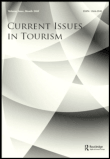
Current Issues in Tourism
Shaping the Dialogue on Sustainable Tourism PracticesCurrent Issues in Tourism is an esteemed academic journal published by Routledge Journals, Taylor & Francis Ltd, dedicated to enhancing the understanding of critical issues in the field of tourism studies. Recognized within the top Q1 quartile for both Geography, Planning and Development and Tourism, Leisure and Hospitality Management, this journal occupies a significant position in the academic landscape, with outstanding rankings in Scopus that reflect its impact and relevancy. With its comprehensive scope, covering topics from sustainability to policy impacts, the journal serves as a vital resource for researchers, practitioners, and students alike. Though not currently an open access publication, Current Issues in Tourism encourages the dissemination of innovative research and critical discourse, aiming to advance the field through rigorous peer-reviewed contributions. Since its inception in 1998, it remains committed to publishing timely and impactful articles that address contemporary challenges and opportunities in tourism, ensuring it is an essential reference for those who aspire to contribute to this dynamic discipline.

Anais Brasileiros de Estudos Turisticos-ABET
Advancing Knowledge in Tourism StudiesAnais Brasileiros de Estudos Turisticos (ABET), published by Universidade Federal de Juiz de Fora in Brazil, is a pivotal journal dedicated to the field of tourism studies. With an ISSN of 2238-2925, this journal serves as a vital platform for the dissemination of research and scholarly articles that explore the multifaceted aspects of tourism, including its socio-economic impacts, cultural dimensions, and sustainable practices. Although it currently operates without an open access model, the journal provides valuable insights and fosters interdisciplinary dialogue among researchers, professionals, and students alike. Its commitment to enhancing the academic landscape of tourism studies reinforces its importance, especially as the global tourism sector continues to evolve in response to contemporary challenges. Engage with ABET to stay at the forefront of emerging trends and insights in the tourism domain.

Annals of Tourism Research Empirical Insights
Exploring the Dynamics of Tourism through Data-Driven InsightsAnnals of Tourism Research Empirical Insights, published by Elsevier, is a distinguished open-access journal established in 2020, dedicated to advancing the field of tourism research. With its ISSN 2666-9579, this journal not only fosters scholarly communication but also promotes unrestricted access to valuable empirical studies and insights that inform tourism policy, planning, and practice. The journal has quickly gained recognition, earning a place in the Q1 quartile of Geography, Planning and Development, Sociology and Political Science, and Tourism, Leisure and Hospitality Management, and Q2 in Marketing as per the latest rankings. With an impactful ranking, including 88th percentile in Sociology, it stands as a critical resource for researchers, practitioners, and students aiming to explore contemporary dynamics and innovations within the tourism sector. Based in the Netherlands at RADARWEG 29, the journal aims to bridge the gap between theory and practice through evidence-based contributions, fostering a deeper understanding of the intricate relationship between tourism and societal trends.
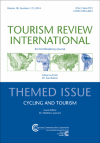
Tourism Review International
Fostering Global Conversations in Tourism ResearchTourism Review International, published by COGNIZANT COMMUNICATION CORP, stands as a pivotal resource in the field of Tourism, Leisure, and Hospitality Management. With an ISSN of 1544-2721 and an E-ISSN of 1943-4421, this journal has been delivering insightful research and analyses since its inception. Having achieved a commendable Q3 ranking in the 2023 Scopus category, it holds the 72nd position out of 146 in its field, featuring an engaging array of studies that contribute to understanding contemporary trends and challenges within the tourism industry. The journal seeks to publish high-quality, peer-reviewed articles that offer meaningful insights into tourism practices, policy implications, and innovative strategies, making it essential reading for researchers, professionals, and students passionate about the evolution of tourism. With access options tailored to facilitate scholarly communications and knowledge dissemination, Tourism Review International continues to foster a vibrant academic community dedicated to advancing the discourse in tourism and hospitality worldwide.

Zeitschrift fur Tourismuswissenschaft
Connecting Researchers and Practitioners in TourismZeitschrift für Tourismuswissenschaft is a premier journal dedicated to the dynamic field of tourism studies, published by WALTER DE GRUYTER GMBH. With its focus on contemporary research and theoretical advancements in tourism, this journal serves as an essential resource for researchers, industry professionals, and students alike. The ISSN for print is 1867-9501 and the E-ISSN is 2366-0406, ensuring comprehensive accessibility to the latest scholarship in the field. Although currently not designated as Open Access, the journal provides an array of articles that contribute significantly to the understanding of tourism's economic, social, and environmental impacts. Located in Berlin, Germany, Zeitschrift für Tourismuswissenschaft aims to bridge the gap between academia and practice, making it an invaluable tool for those seeking to deepen their knowledge and engage with the latest developments in tourism research.
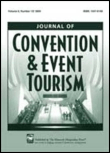
Journal of Convention & Event Tourism
Innovating the Landscape of Event TourismThe Journal of Convention & Event Tourism is a premier academic platform, published by Routledge Journals, Taylor & Francis Ltd, specializing in the dynamic and ever-evolving field of tourism and event management. With an ISSN of 1547-0148 and E-ISSN 1547-0156, this journal serves as a vital resource for researchers, professionals, and students seeking to deepen their understanding of the convention and event tourism landscape. Ranked in the Q2 category for 2023 in Tourism, Leisure and Hospitality Management, it occupies a prominent position within the Scopus database, holding the 54th rank out of 146 in the field. Covering a broad spectrum of topics from innovative event strategies to the economic impacts of tourism, the journal aims to foster knowledge sharing and scholarly dialogue, driving forward the academic discourse within this significant sector. This makes it an essential read for anyone involved in the tourism and events industry.